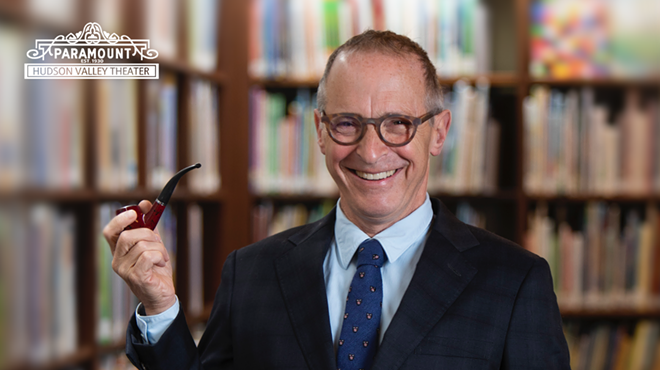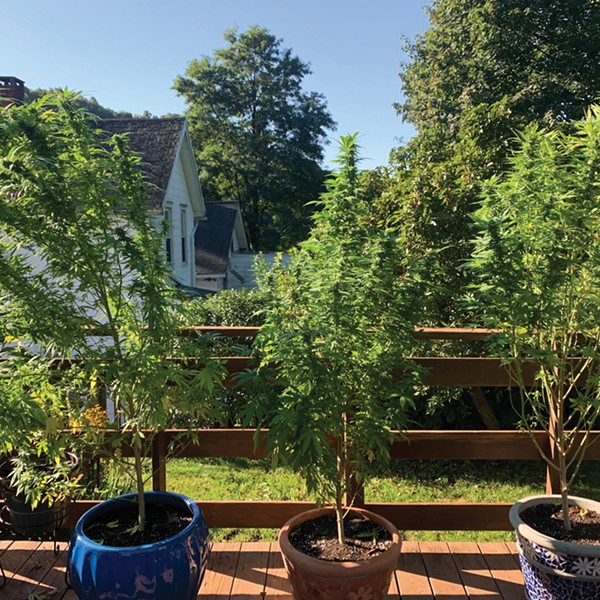
During a recent cannabis networking event in Kingston, Dana Goldberg looked somewhat out of place. The Hudson Valley Cannabis Roll Call at Seasoned Delicious was packed. The room was filled with cannabis entrepreneurs, farmers, investors, and advocates, pot aficionados zigging in and out of the event to light up outside. Goldberg, an associate real estate broker, surveyed the room intrigued and happily mystified, not by her own passion for smoking cannabis but by the prospect that her 24-year-old son Markus could network to hopefully find a job in the burgeoning industry.
Markus, who was a few feet away from his mother, was engaged in a passionate conversation with a hemp farmer who was awarded a conditional license by the state to help produce the first yield of legal cannabis flower in New York. They were discussing the unprecedented nature of the cannabis roll-out by New York’s Office of Cannabis Management (OCM), and asking questions about the final phase of the process to get marijuana in the hands of recreational users: distribution. This question arose: How will the OCM get adult-use dispensaries up and running for their proposed end-of-year launch date?
Markus, who advocates for medical marijuana patients access to local, reputable, and affordable cannabis, sort of shrugged and smiled. The reality is no one really knows how the OCM will get dispensaries fully stocked and operational by December 31.
Seeding Opportunity
Many hurdles could delay the target date. It is widely understood that the hemp farmers who were the first licensed to grow cannabis in the state will not yield enough product to meet the state’s demand. Also, the people interested in operating New York’s first legal dispensaries are waiting for the state to open an application portal that will review their eligibility as the potential inaugural cohort of recreational dispensaries in the state. On July 14, the Cannabis Control Board approved the regulations and application to apply for a retail dispensary license.The Marijuana Regulation & Taxation Act (MRTA), signed into law on March 31, 2021, established a goal of awarding 50 percent of all New York State adult-use licenses to social and economic equity applicants. This means that people who were previously convicted of a marijuana-related offense in New York; had a parent, legal guardian, child, spouse, or dependent who was convicted of a marijuana-related offense; or who were the dependent of someone who was convicted of a marijuana related offense will be the first in New York to operate adult-use cannabis dispensaries.
Social equity programs in other states like California, where the recreational sale of cannabis is dominated by large corporations, ultimately have not helped systemically level the playing field of legally operating a cannabis business for individuals who have been disproportionately impacted by the War on Drugs. In Massachusetts, only 29 social equity businesses out of 380 cannabis licensees, roughly seven percent, have received the go-ahead to commence operations.
New York’s conscious effort to position people with cannabis-related offenses at the forefront of the legal cannabis market is a part of the state’s Seeding Opportunity Initiative. “With the Seeding Opportunity Initiative, New York is on the path to do something no other state has done before: making sure justice-involved entrepreneurs and local farmers are the ones launching our adult-use cannabis industry,” says Aaron Ghitelman, deputy director of communications at OCM. “In creating this national model, the Seeding Opportunity Initiative takes a step toward achieving the goals of New York’s Cannabis Law, which aims to undo the harm caused to individuals and communities by the disproportionate enforcement of the cannabis prohibition.”
The Social Equity Cannabis Investment Fund, a $200 million public-private partnership, was also created to help social equity entrepreneurs finance the leasing and furnishing of up to 150 retail dispensaries, all of which will be operated by people who have been disproportionately impacted by the prejudiced enforcement of marijuana laws. The fund, which will be managed by NBA Hall of Famer Chris Webber’s Social Equity Impact Ventures, will help holders of the Conditional Adult-Use Retail Dispensary (CAURD) license pay for establishing a dispensary, leasing a retail space, designing the storefront, construction, and all the costs associated with opening a small business. Fifty million dollars of the funds money will come from licensing fees and revenue from the adult-use cannabis industry, and up to $150 million will be raised from the private sector by Social Equity Impact Ventures and Siebert Williams Shank, a leading minority-and-women-owned investment banking firm.
“I feel like the OCM is moving at a pace that is a little bit faster than I would like to see,” says Ruben Lindo, a former NFL player who now is the CEO of Blak Mar Farms, a multistate cannabis cultivation, operations, and management company based in Saugerties. Lindo is a legacy operator, meaning he was involved with the distribution of cannabis in Arizona, California, Washington, and even parts of Canada before it was legal.
“Being a professional athlete, everyone thinks, ‘Oh, you made millions of dollars, you had the world and the riches.’ But the truth of the matter is: some professional athletes like myself basically lived and operated paycheck to paycheck. We had to make ends meet in the offseason,” Lindo says.
The Cost of Entry
Lindo estimates that it will cost $250,000 to $500,000 to get the initial cannabis dispensaries in New York up and running.Vanessa Yee-Chan, the Founder and CEO of Bloomlee Dispensary, a company that plans to provide cannabis specifically to first-time users in New York City, estimates the cost to build out one dispensary location at “a couple million dollars.” Vice President of Bloomlee Dispensary, Heidi Reiss, estimates the cost to be at least between $500,000 to $1 million.
Yee-Chan and Reiss’s interest in New York’s legal cannabis market is not as social equity entrepreneurs but rather as small business professionals who are getting their business organized for the time when the state opens the dispensary license eligibility to the broader population.
The two met on Frost Street in Brooklyn in 2007. “We were the only pregnant ladies on the block, so we noticed each other,” Yee-Chan says.

She plans to house their flagship dispensary in lower Manhattan in a building she inherited. “When my family first bought the building, there was a general store in the space, but my family converted it into a local hardware store to fill a need in the neighborhood,” Yee-Chan says.
Yee-Chan and Reiss now plan to fill a different need for the neighborhood: access to quality, legal cannabis, something Yee-Chan says her grandparents, who have passed away, would ultimately have supported.
They consider themselves fortunate to already have a retail space. But for social equity entrepreneurs looking to get their foot in the door of the legal market, renting retail space is a part of the deal. Yee-Chan believes that landlords might be hesitant to lease retail space to business owners selling legal cannabis, and this could be a potential reason why the application portal is not online yet.
“I think that we’re looking at uncharted territory right now,” Lindo says. “Saying the state of New York is going to plop people into these buildings and open their doors. My number one fear is the first time someone stands in line for an hour and a half at one of these dispensaries, they walk out with cannabis that does not meet or exceed their expectation or the expectations of what they were getting from the street.”
Over the next five years, it is certain that the OCM will continue going through a growth period. Like a budding teenager, uncertain of their role in the world, with great ideas, growing pains are inevitable.
“It can’t just be that we have Black and Brown people with the first 150 or 200 licenses with the ability to fail. What happens if these businesses go out of business at an alarming and astounding rate because there’s no guardrail or no structure put in place to support them? That’s not successful to me. Just doing it to say that we’ve achieved it is not doing it,” Lindo says.
The process of creating retail spaces for the purpose of purchasing recreational cannabis is happening entirely through regulation in New York. Nowhere in the state’s cannabis law are there parameters on how retail spaces will be created and to what extent the OCM will support business owners in the inaugural years of operation.
Aaron Ghitelman of OCM says, “Through the $200 million public-private Social Equity Cannabis Investment program Governor Hochul secured in the most recent state budget, storefronts will be secured and renovated as turnkey operations for Conditional Adult-Use Retail Dispensary licensees, an unprecedented level of support for equity entrepreneurs at the start of an adult-use industry.”
Timothy Mitchell, a consultant working for the Albany-based company GENESYS, fears that the strings attached to the retail dispensary licensees may be too restrictive and confining.
“One doesn’t get to choose their exact location, so what was a good market on paper may end up being a bust for the location,” says Mitchell “If a contracted supplier has a bad harvest or runs into testing issues, it may not be easy, quick, and/or affordable enough to get new contracts in place—will a shop be able to survive if they have little for sale?”

Mitchell also has doubts that the recreational cannabis licenses may not even go to legacy operators. “In order to qualify for CAURD, they need to provide proof of running a successful business—a metric met likely by showing you file taxes and keep good financial records,” Mitchell says. “One is supposed to file taxes on income, even though it also means basically incriminating yourself.”
Lindo believes that New York needs to provide legacy operators who either continue working in the gray market or who get denied a legal dispensary license amnesty from the federal government. “You have to allow them to come in with their industry knowledge and experience and bring their customers into the legal market. That converts into taxable dollars.”
There is still a lot to be determined. Jen Metzger, a former state senator and the senate’s appointee to the Cannabis Control Board, attributes this to the fact that nothing like this has been done before. “We anticipate licensing by the fall,” says Metzger. “The hope is to get dispensaries opening their doors before the end of the year,” she says. “Maybe it will be on New Year’s Eve!”

















